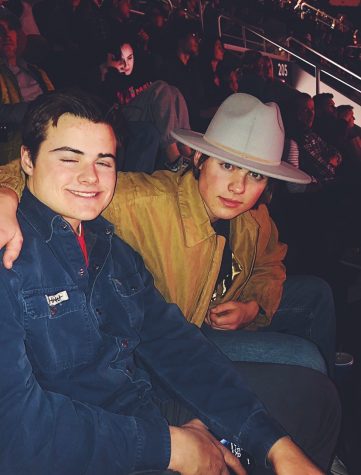Three hundred million
Oct 29, 2020

One of my favorite songs to sing to the point where my lungs feel like they will burst is “Leader of the Landslide.” It is not because of the buildup of white noise that floods my ears with every hit of the drum. It is not because I am biased to falling in love with every song The Lumineers create. It is because the intimate crescendo of the song is about a family member struggling with addiction.

The band’s third album “III” was released Sept. 13, 2019, and has found its way into nearly every playlist I’ve made. I’ve almost become reliant on listening to the album because of its fictitious portrayal of a very real story and experience that nearly 300 million people in the world face: alcohol addiction.
If you have not been impacted by addiction before, you may find it hard to understand how people cope with it. People who have experienced addiction have told me there are quite a few practices to cope with alcoholism including cooking, running, getting tattoos, volunteering and my go-to, writing it all out.
Singer-songwriter and multi-instrumentalist Jeremiah Fraites and lead vocalist and guitarist Wesley Schultz started making music together when Fraites’ brother died of addiction in 2001 at only 19 years old. Fraites’ brother was one of Schultz closest friends. I did not learn this until the release of their most recent album. After learning the band’s history, I only felt my connection to them and the stories they tell deepen.
I’m on almost five years of denial, dozens of therapy sessions focused on the topic of addiction, countless articles trying to find the why, and many drives around town listening to “III.” The song “Leader of the Landslide” has heart-wrenchingly resonated with me mostly because, for Schultz, the song was about his mother’s alcoholism.
“You drove me wild, drove me insane/ drank the whole bottle/ forgot my name.”
One of the only ways I can feel better is by listening to music that feels like it was written about my own experiences. It is as if the song was written by my own hand, and someone else picked up the guitar chip and began singing how I felt because I did not have the ability to say it myself.
If 300 million people have an alcohol abuse problem, that means millions of people might be feeling the same way I feel around the world. But why does it feel like I am the only person in the world trying to work through this?
A friend of mine once told me, “Addiction is a family disease. One person may use, but the whole family suffers.”
If you are someone who struggles with addiction in your daily life, I want to remind you that the only person you are in control of is yourself. A person with an addiction has to want to change for himself or herself. You could be the love of their life, their best friend, their daughter or their son, but they need to want to get better. You can’t make them better.

You can’t make them better. Writing that out gives me the biggest lump in my throat. I know it is the truth that I refuse to say out loud, but I need to remind myself of these words. Addiction is not only a heartbreaking disease for the one holding the bottle but for the people left not knowing what to do to help.
You think that alcoholics bury their feelings? The children of alcoholics tend to bury their feelings even deeper. They fear losing control themselves. They fear conflict if they express how they feel. They fear denial. Grief. Loss. Knowing this has helped me come to terms with the fact that I need to focus on myself now.
“The only thing I know is that we are in too deep.”
I am writing this for the person who feels out of control or who feels that any rescuing is not going to work. I am here to tell you that the most important thing you can do for yourself is to focus on you. How can you heal from your experience of having a loved one be an alcoholic? How can you vocalize and release the emotions you feel regarding your situation? How can you heal?
For me, for now, it’s listening to The Lumineers on repeat at the loudest possible volume, windows down, heat blasting at my feet while I sing and cry and let it out. I’m hoping to find more healing processes soon. It’s a work in progress.
Resources:
Al-Anon: https://al-anon.org
Alcoholics Anonymous: https://www.aa.org
SAMHSA National Hotline: https://www.samhsa.gov/find-help/national-helpline
John Carroll University Counseling Center: https://jcu.edu/student-life/health-wellness-and-safety/ucc-university-counseling-center












